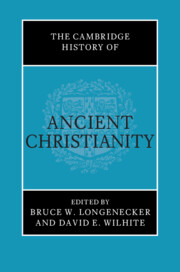Book contents
- The Cambridge History of Ancient Christianity
- The Cambridge History of Ancient Christianity
- Copyright page
- Contents
- Figures
- List of Contributors
- Editors’ Preface
- Part I Contested Contexts
- Part II Contested Figures
- 5 Remembering Jesus in Earliest Christianity
- 6 Remembering Jesus in the Second and Third Centuries CE
- 7 Paul and His Diverse Champions
- 8 Peter and His Diverse Champions
- Part III Contested Heritage
- Part IV Contested Cultures
- Part V Contested Beliefs
- Part VI Contested Bodies
- Ancient Sources
- Modern Authors
- References
8 - Peter and His Diverse Champions
from Part II - Contested Figures
Published online by Cambridge University Press: 23 August 2023
- The Cambridge History of Ancient Christianity
- The Cambridge History of Ancient Christianity
- Copyright page
- Contents
- Figures
- List of Contributors
- Editors’ Preface
- Part I Contested Contexts
- Part II Contested Figures
- 5 Remembering Jesus in Earliest Christianity
- 6 Remembering Jesus in the Second and Third Centuries CE
- 7 Paul and His Diverse Champions
- 8 Peter and His Diverse Champions
- Part III Contested Heritage
- Part IV Contested Cultures
- Part V Contested Beliefs
- Part VI Contested Bodies
- Ancient Sources
- Modern Authors
- References
Summary
Simon Peter is a “key” figure in the truest sense of the word. When he utters his confession, “You are the Messiah, the son of the living God” (Matt. 16:16), Jesus praises him, promises to build his ἐκκλησία on “this rock” and offers him the keys of the kingdom of heaven (Matt. 16:18–19). There are certainly not many passages of the New Testament that have generated more controversy than Matt. 16:17–19.1 This is not only due to the text’s many difficulties in detail, but also to the fact that different churches based important aspects of their self-definition (and related claims for authority) on these sayings. The Roman Catholic Church, for example, went so far as to deduce important aspects of the pope’s claim to be Christ’s representative on earth and thus his supremacy over all other churches from this passage. Neither the Orthodox Church nor the churches of the Reformation agree with that. A proper understanding of the figure of Peter and (deeply related to that) the role and authority of his successors has thus been a key obstacle to past and present ecumenical movements.2 And even if all churches basically agree on the importance of Peter for the beginnings of the Christian movement, he nonetheless remains a contested figure to this day. In the following essay, I will show that this has always been the case: Peter has always been a controversial figure within the variety of movements comprised of believers in Jesus Christ.
- Type
- Chapter
- Information
- The Cambridge History of Ancient Christianity , pp. 175 - 196Publisher: Cambridge University PressPrint publication year: 2023

